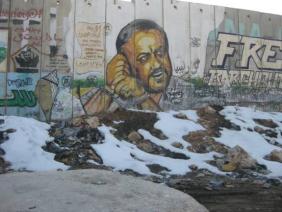Qalandiya
Translator: Charles K.
On cops and hunters

For five days the Qalandiya refugee camp had no electricity or water, said Mahmoud. “Just like you.” No, Mahmoud, I thought, not exactly like us – not exactly.
The remnants of the snow at the wall seemed to make Marwan Bargouti’s image – on the wall above them – paler. Perhaps because of the glare from the snow, or maybe I’m imagining it, but it seems that today, when Palestinian political prisoners will soon be released, the image of Marwan Bargouti, like Bargouti himself, who’s rotting in jail, a man who might have led the Palestinian people to independence, is fading from consciousness and perhaps also from history.

Menashe Hai’s hand – he’s a policeman – covered the camera lens when I pointed it at three Border Police soldiers, headhunters, at the entrance to the Qalandiya checkpoint. When I kept trying to take pictures he took me to the police station where I received a lecture from Ami, the checkpoint commander, the core of which were the regulations prohibiting photography throughout the checkpoint area. Ami demanded I promise to follow the rules. I refused. I know rules are rules, but the law is the law and it’s different from Ami’s rules. According to the law, photography is permitted wherever civilians are present, including the checkpoint area.
lens when I pointed it at three Border Police soldiers, headhunters, at the entrance to the Qalandiya checkpoint. When I kept trying to take pictures he took me to the police station where I received a lecture from Ami, the checkpoint commander, the core of which were the regulations prohibiting photography throughout the checkpoint area. Ami demanded I promise to follow the rules. I refused. I know rules are rules, but the law is the law and it’s different from Ami’s rules. According to the law, photography is permitted wherever civilians are present, including the checkpoint area.
“If you won’t understand willingly, you’ll understand in another way,” Menasheh, the policeman, told me. I was detained. They issued a summons: “Failure to obey a policeman’s order.” Case No. 123, Menashe reported it by phone to somewhere, they ordered a squad car from somewhere to take me for interrogation and also threatened that the interrogator might decide to arrest me. I took that into consideration in deciding not to change my mind.
But the squad car didn’t arrive. Menashe called again, reminded them, requested. And the squad car still didn’t arrive.
I didn’t want to sit in the policemen’s room. I told them I’d rather not be in an unpleasant location. I stood outside the door. Passing soldiers looked at me, whispered among themselves as if I were on display in a zoo.
I thought about the hundreds of Palestinians I saw detained over the years. If they were, I could be also. But it’s not really the same thing – at least, not yet.
I knew, as did Menashe who was ordered to guard me, that according to the law a person can’t be detained for more than three hours. Toward the end of the three hours Menashe, whose shift was ending and whose wife had given him a shopping list over the phone, hurriedly filled out a detention form. I signed the paragraph confirming I hadn’t been beaten, nor had anything been taken from me. There wasn’t any place to write down the time stolen from me.
I was released. I’d been detained for eight minutes less than three hours. I went out into Qalandiya’s very cold night and saw the three Border Police soldiers still on duty; a man and a youth stood next to them, shivering in the cold.
